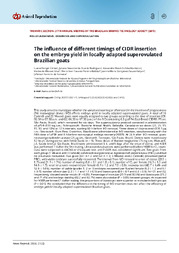The influence of different timings of CIDR insertion on the embryo yield in locally adapted superovulated Brazilian goats.
The influence of different timings of CIDR insertion on the embryo yield in locally adapted superovulated Brazilian goats.
Author(s): CORTES, L. R.; RODRIGUES, J. N. D.; MONTEIRO, A. W. U.; SILVA, K. de M.; BATISTA, R. I. T. P.; SOUZA-FABJAN, J. M. G.; FONSECA, J. F. da
Summary: This study aimed to investigate whether the variation (morning or afternoon) in the insertion of progesterone (P4) intravaginal device (IVD) affects embryo yield in locally adapted superovulated goats. A total of 16 Canindé and 22 Moxotó goats were equally assigned to two groups according to the time of insertion (G1:06:30 to 07:30 a.m. and G2: 06:30 to 07:30 p.m.) of the IVD containing 0.3 g of P4 (Eazi-Breed CIDR®; Pfizer, São Paulo, Brazil), which remained for six days. As expected for NSER performed 7 d after mating, the proportions of blastocyst were superior to morulae in both groups (P < 0.01). We concluded that the difference in the timing of IVD insertion does not affect the efficiency of embryo yield in locally adapted superovulated Brazilian goats.
Publication year: 2024
Types of publication: Abstract in annals or event proceedings
Unit: Embrapa Goats & Sheep
Observation
Some of Embrapa's publications are published as ePub files. To read them, use or download one of the following free software options to your computer or mobile device. Android: Google Play Books; IOS: iBooks; Windows and Linux: Calibre.
Access other publications
Access the Agricultural Research Database (BDPA) to consult Embrapa's full library collection and records.
Visit Embrapa Bookstore to purchase books and other publications sold by Embrapa.

